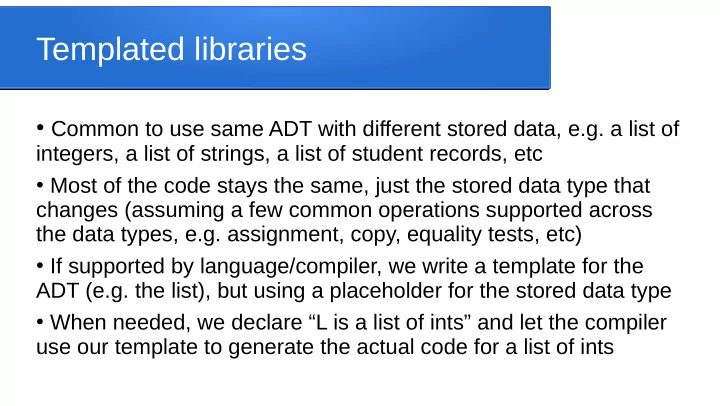

Templated libraries ● Common to use same ADT with different stored data, e.g. a list of integers, a list of strings, a list of student records, etc ● Most of the code stays the same, just the stored data type that changes (assuming a few common operations supported across the data types, e.g. assignment, copy, equality tests, etc) ● If supported by language/compiler, we write a template for the ADT (e.g. the list), but using a placeholder for the stored data type ● When needed, we declare “L is a list of ints” and let the compiler use our template to generate the actual code for a list of ints
C++ standard template library (STL) ● The C++ STL provides a wide variety of ADTs in templated form, e.g. for stacks, queues, lists, vectors, sets, etc ● When we want to create, say, a stack of ints, we include the appropriate library (<stack>) and when we declare a stack we specify the datatype to be used: stack<int> S ; ● We can then use any of the provided methods, e.g. S.push(27); ● ADTs in the STL are widely used, robust – try them!
Creating our own templates ● We can create our own templated classes and/or functions ● We tell compiler that the thing we’re about to define is just a template for the compiler to use if/when needed, specifying the name we’ll use for the “unknown” data type template <class T> void swap(T &x, T&y) { T tmp = x; x = y; y = tmp; }
Compiler builds what it sees used ● For the swap example, if compiler sees instruction like swap(user1,user2); it looks at the data types of user1 and user2 – if they’re both ints then it builds an int version of swap, if they’re both strings then it builds a string version of swap, etc ● We can also include code that explicitly tells the compiler some of the things to build (instantiate), e.g. syntax for telling it to build an int version of swap is template void swap<int>(int, int)
Separate compilation issues Suppose we have a prototype for swap in swap.h and the code for ● swap in swap.cpp Suppose we also have a file, somecode.cpp, that #includes swap.h ● and calls swap on a pair of doubles When the compiler processes swap.cpp, it has no inkling of what’s in ● somecode.cpp, so doesn’t build a doubles version When compiler processes somecode, it has no idea what was put ● into swap.o, just trusts there’s a double version When we go to link swap.o and somecode.o we get a linking error ●
Two possible solutions ● In swap.h we could put a list of instantiations for swap, specifying all the data types permitted for swap ● That works, but not very flexible – need to edit and recompile if we think of an additional data type ● Alternative is to put the entire template in the swap.h file, so that the whole template gets included by any file making use of swap ● This works as desired, but does expose the swap implementation details in the .h file
Recommend
More recommend